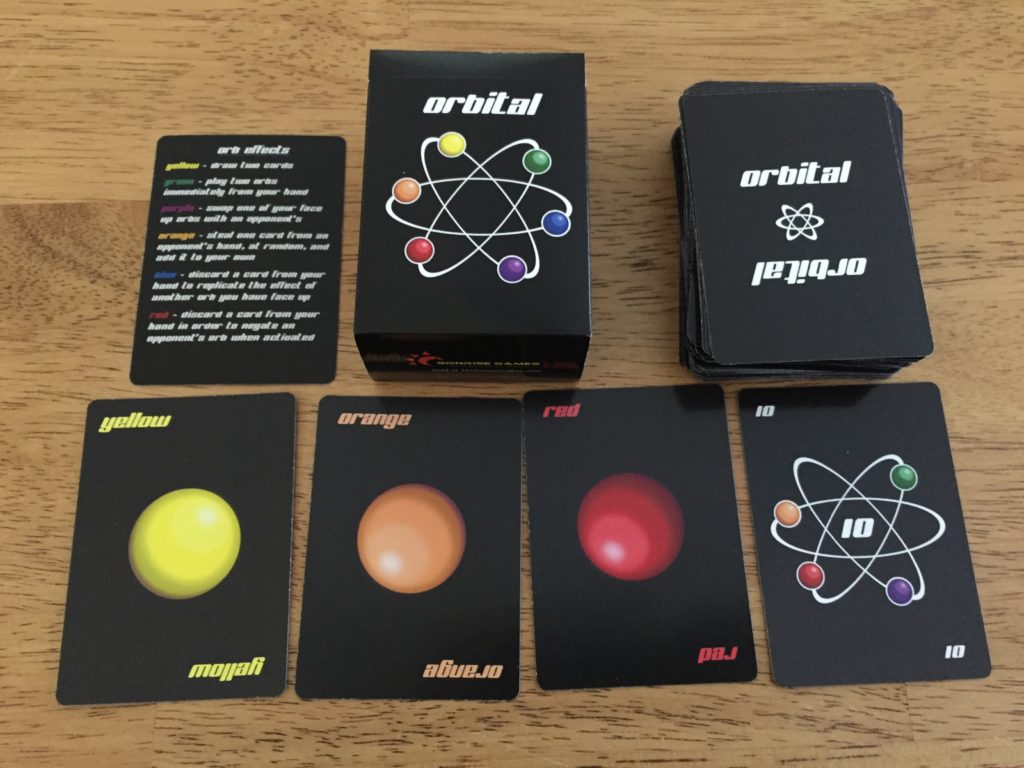100 orbital points is all you’ll need to win this game but in reality, it’ll take you a bit of luck and brain power to get there. “Orbital”, a 2-4 player card game that’s presently being sold on The Game Crafter, has a relatively simple premise but is pretty engaging at the same time. In short, you’ll be playing orbs of different colors in front of you which you can later activate for their special abilities, though doing so will force you to discard it from play. This is key, as orbital cards, the very thing that scores you orbital points, requires orbs. Before I go any further, I want to thank Game Creator Doug Clelland for providing me with a press copy for review purposes.

Orbital: 2-4 Players, Ages 12+, Average Play Time = 30-60 Minutes
The contains 66 orb cards (11 of each color), 40 orbital cards, 2 reference cards, and an instructions booklet. To set up, someone will shuffle the orb and orbital cards together to form the face-down draw deck, then dealing four cards to each player. The reference cards are placed within sight of all players as best as possible. Turns progress clockwise with the starting player chosen at random.
On a player’s turn, they’ll:
1. Draw two cards from the main deck OR from their orbital reserve deck (I’ll get to that in a minute).
2. Play up to two orbs from their hand face-up. (Optional)
3. Activate as many orbs as they want, discarding each from play into their personal discard pile face-up. (Optional)
4. Play one orbital card from their hand by discarding the required orbs from their face-up supply into their personal reserve deck for later use (see step 1). Orbital cards go into a score pile.
Play continues until a player ends their turn with 100 or more orbital points OR until the last card is drawn from the deck. The remainder of that round is played out so that each player has an equal number of players. Whoever has the most points, wins! In case of a tie, whoever has more cards in their discard pile is the winner.
It’s important to stress that I didn’t cover everything in the rule book, but the above should give you the general idea. For example, each orb color has a different effect when discarded for their ability. Yellow lets you draw two cards while green lets you play two orbs immediately from your hand, just to rattle off a few examples. These abilities can be game changing in some ways, though it’s important to remember that saving orbs is key to being able to play orbital cards which actually score you points.
The dual use of the cards (for their abilities or as currency for an orbital) is probably the biggest strategic drawl the game has to offer. I found myself constantly looking at my hand to see how I wanted to spend my orbs. “Do I want to spend this orange so I can steal a card, or do I want to save it in case an orbital comes up that requires that color?” Luckily, you can leave orbs in front of you for as long as you’d like, though you leave them open to purple’s effect, which is to swap one of your face-up orbs with an opponent’s. At least with orange’s ability you’re somewhat safe, as it allows you to steal from an opponent’s hand at random…meaning there’s a chance they’ll grab something you don’t want anyway.
“Orbital” is simple enough for almost any gamer to enjoy, so I wouldn’t take the 12+ age requirement on the box to heart. A gifted eight or ten-year-old could probably play this game, though as a parent you’ll have to be the deciding factor as kids tend to mature at different speeds. As set collection games go, “Orbital” is fairly good. Is doesn’t do anything extraordinary to rock the boat, but this is good news for older, casual gamers who don’t feel like hitting their head off a wall trying to understand the rules of a game they just picked up.
I personally liked the abilities and the overall flow of play. The game starts off simple, though takes a turn towards the middle when you can potentially have a LOT of orbs out on the table. Once this happens, you’re left wondering what your opponent is going to do. Will they activate their orbs for their ability, or do they have an orbital card or two in their hand that they’re trying to score? Of course, players are free to try for one orbital and then switch tactics when they feel that they’ll never get the required colors quickly enough. The game is selling for $19.99, a fair price considering that most card games I see retail for a little less or more than twenty dollars.
Final Verdict: 8/10
Buy: https://www.thegamecrafter.com/games/orbital1
—
